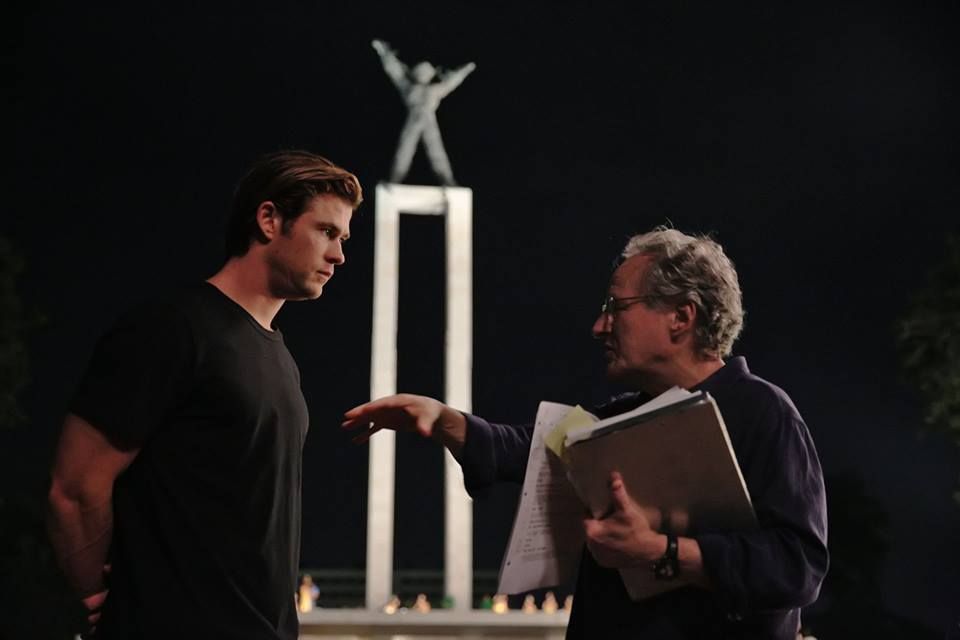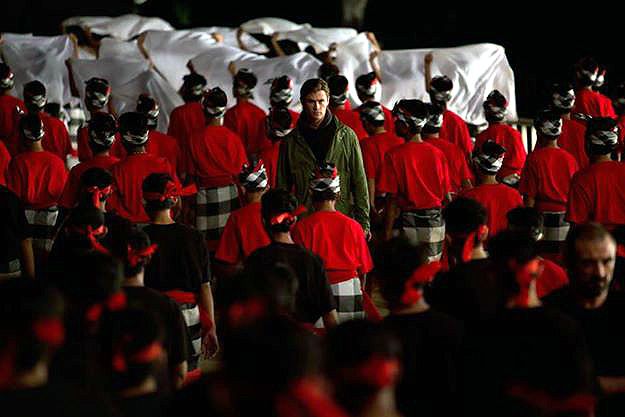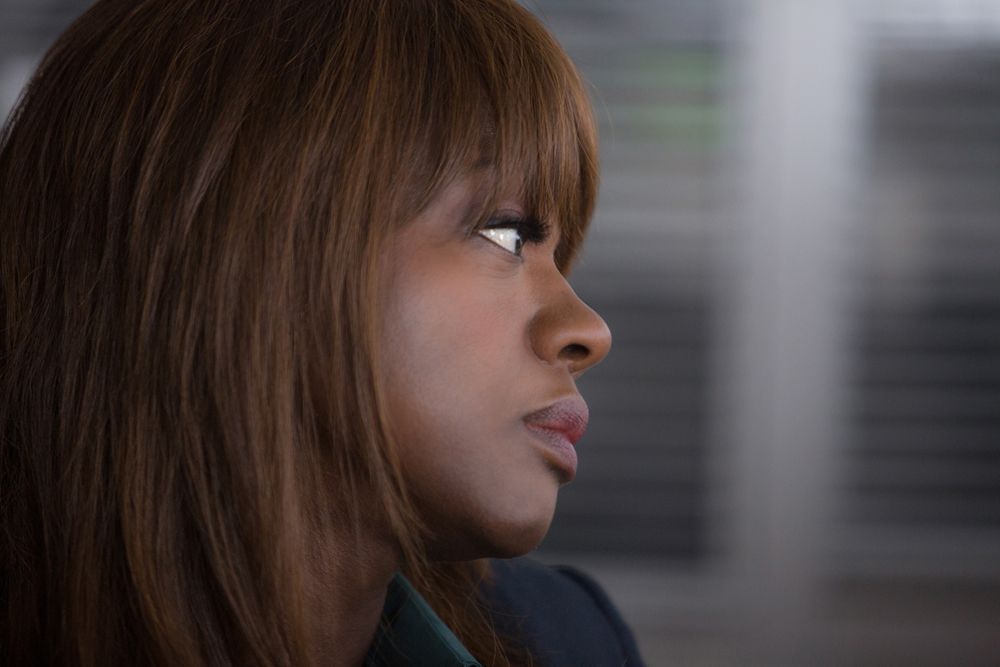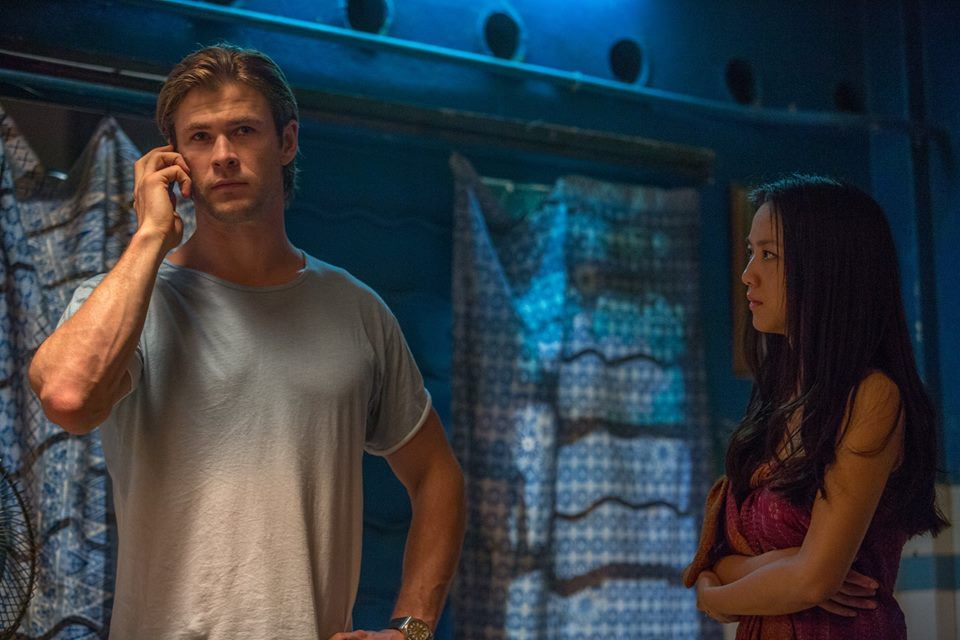Director Michael Mann, whose lengthy filmography of stylish, tough-minded crime thrillers that includes Manhunter, Heat and Collateral, is taking Thor star Chris Hemsworth into a new and even more unpredictable realm: the world of cyber-terrorism.
In Mann's latest film Blackhat, Hemsworth plays Nicholas Hathaway, one of America’s boldest hackers who, after a fall from the heights of notoriety leaves him simply another inmate, is looking for an opportunity to re-code his own life. He gets that chance when a group of American and Chinese law-enforcement agencies – and a wary, no-nonsense investigator (Viola Davis) – offers him a furlough if he’ll help track and stop a mysterious super-hacker whose unreadable agenda poses a threat to both global security and economy.
For the leading man, the opportunity to once again find a fresh, challenging character after setting down the hammer of his highest-profile role was a welcome one. "The Marvel Universe that I have been and will be so heavily involved in is the greatest thing for me, and I love playing the character," Hemsworth told a group of journalists. "But I love it when I'm able to mix it up and break it up with other things and films like this that are much more based in reality and detail and precision. And with somebody like Michael Mann, it was an absolute dream."
On the origins of the project:
Michael Mann: The genesis was two-fold: One, I was interested in doing something in Asia, but the real genesis is when I went to Washington and started talking to folks there about cyber-intrusions and cybertheft and what was happening in the world. And it was kind of an eye-opening experience that the way we live our lives, the way that we think our lives are, is not really the way they are anymore – that we're porous, and we're vulnerable to intrusions from everywhere, and we just don't know. It's kind of like we're in a house without doors or windows in a dangerous neighborhood, and we don't know it. And the extent of it, it was widespread: it was a hot-button issue in Washington a couple years ago, and we came back to Los Angeles and we started talking about it. And people didn't know what we were talking about. But that's kind of where it began. And then from there, it went right to, "OK, who's the guy? Who's the main character?" And to try and learn everything there is to know about black hat hackers. What motivates them? What exalted experience is? And you just got done talking to two guys who are quite extraordinary that gave you some kind of a sense of that.
Chris Hemsworth: Michael was one of my favorite filmmakers, and I'd grown up watching his films, so even before I'd read the script, I was pretty much diving into the thing. But then I read the script, and it was a subject that I certainly had been involved in on screen, but in my life was something it was fairly new to me. I was pretty limited in my digital/cyber involvement, and it fascinated me. When we were researching the film, it did exist, all the things that in the news now, but it wasn't as public. And the idea that we are as vulnerable as the film talks about was something that I wanted to learn more about and jump into that opportunity.
Viola Davis: I wanted to be a part of anything that Michael was directing. I think that you always want to gravitate towards people who absolutely are great at what they do and go for authenticity. And cyber-terrorism was a subject matter that fascinated me also. I mean, listen, I remember playing an FBI agent many moons ago, and I sat with some FBI agents and they said cyber-terrorism was more potent than actual terrorist attacks. And I thought to myself "Wow!" And it was something that I wanted to learn more about it – and exotic locations did appeal to me also.
On what they learned from the real-life experts and hackers who consulted on the film:
Mann: The first thing is they were with us. We do a kind of immersive preparation to get into character, and that starts many, many months before we start shooting. So whether it's learning coding or Viola visiting Michelle Leonard at the DEA, the women of law enforcement, you pick up how somebody thinks, what their attitudes are, what their background is, how they walk, how they talk, how they drink a cup of coffee. It's so rich. So it's always a great idea, from my point of view, to work with actors who are turned on, as all these folks are, by that same thing: that kind of immersive research. And from these guys specifically, it was coding from [former FBI cybercrime investigator and digital security specialist] Mike Panico, who is different kinds of hacking; from [former hacker turned tech journalist] Chris McKinley, who spent time with Chris, so Chris could write code. And Kevin Poulson had experiences as a black hat hacker. And that's how Leehom [Wang] and Chris and Tang Wei all interacted with these folks. I said, "Am I being paranoid in not wanting to take a laptop to where we're going to look for locations?" And they said, "None of us ever take our laptops to where we go look for locations." So people who have been in the know have understood the threat for a long time.
Hemsworth: Learning how to write code and understanding the brain of a computer and all that was new to me. I remember asking one of the guys – because you kind of learn pretty quickly that the majority of us know nothing, and I said, "Knowing what you know, when you see behind the curtain, do you look at the world differently?" And he just started laughing and he said, "No. People have no idea how exposed they are and vulnerable and what's possible." And that's it. That's the power now, is the brains – not just in the criminal world, but anywhere is that they're the guys that are the superheroes, you know. And that sort of highly intelligent, alien-type of advancement that these guys seem to have within themselves. Because I think every day impressed me, and a lot of things I picked up.
Davis: I'm a sitting duck! No, seriously. I mean I wish I could say more, but I'm a sitting duck because I can't get ahead of them. They're far ahead of me. Yeah, that's what I learned: how vulnerable we are. It's a big, silent monster out there is what it feels like.
On what led Mann to cast Hemsworth and Davis:
Mann: I can see Hathaway as a guy from a working-class neighborhood, in the South Side of Chicago, whose father was a steel worker because I knew people like that, in the ‘70s particularly. And there was a quality of a certain, very bright, very direct, very centered. And I was sitting with Chris in Costa Rica, and we're just talking and talking, and he didn't know this, but I'm thinking, "This is the guy. This is the guy." [Laughs]. And it was to do with natively: who Chris is. Plus, Chris' enthusiasm for the kind of immersive immersion in a character, that then took us to Statesville prison, and blast furnaces at U.S. Steel at 4 in the morning. And his willingness to kind of lose himself into the moment, which is what all directors look at … Viola, it goes without saying! I mean, great, great, great actress. We're just very fortunate to work with her.
On marrying Mann's signature crime drama style with the new world of cybercrime:
Mann: It takes place in our world. It is right now – right at the cutting edge of this moment, the interconnectedness of all things, everything interconnected with everything else. That's the world we live in now. It's never going back to the way things used to be. And you have a convicted black hat hacker who's got a conditional release from federal prison to pursue a cyber-criminal adversary, a guy who's high-speed, dangerous, world-class. He's a ghost. He's out there somewhere. They don't know who he is, where he is, why he's doing what he's doing. In so doing, Hathaway is [putting behind] his past and is going to take control of a future that he may have, he may not have ... The thrill of making it was that the tropes, the mechanics of the storytelling, it was an opportunity to also pull them out of the very current world we live in right now. so rather than something you might have done 20 years ago when they're trying to find out the location of where a guy might be, by interrogating an informant – instead of that, Barrett and Hathaway con a guy in Vienna, say, to download a password, and he's downloading a PDF, Hathaway's able to get in, download some software, resource a code from the Shiwan reactor, and what does he get? He gets a location. Still don't know who the guy is -- where he is, what he's doing. But they know that this guy's command and control server is in Jakarta, Indonesia. That's a clue. So the storytelling itself, that's very exciting to be able to pull that together, where you can tell the story from that same immediate world of right now.
On Hemsworth's physical regimen and finding Hathaway's American voice:
Hemsworth: The training for this was, once I'm done with Thor – when I get rid of that bulk and that size, because that sort of screams that character – I wanted to do my train set of just running on the treadmill and trying to get the weight mainly built in some sort of martial arts. I boxed a lot in the past. Me and Michael talked about the time you spend in prison: You go in one person, come out another. And through those experiences, he was going to be able to physically handle himself. And whether that was from his background that he'd grown up in, certainly his experiences in prison [honed it]. For the voice, we spent a number of days in Chicago, and there were endless kinds of conversations between Michael and I and working with dialect coaches, and it became more an attitude, I think, than anything else. There was the structural sounds and the phonetics and what have you, but the way this guy spoke and the rhythm to his speech, we picked up, from friends of Michael's in Chicago, also, we went to certain prisons and spoke with people, the way guys in prison spoke, there's a rhythm and a bounce. I had dialect coaches, but Michael was my kind of guide. He was from the place and knew what he was after.
On filming in the various exotic international locations:
Mann: You try to find places that [provide] a kind of interweaving of texts, using visuals, the story, the dialogue, people. And you want places to feel evocative of what the scene's about. That's where it begins. So if there's tension, you want to be in a room that has a very low ceiling, and you try to convey these things that we all, as an audience, feel. And I find Asia a very exciting place to go. I mean, the ultimate thing is that location makes the scene come to life. If we can make a scene come to life, then it comes to life for all of us. For the actors walking in the room, they look out the window of the Hong Kong safehouse and they see all this life on Kowloon, this is really there. It's not digitally put in. And we're not looking at a green screen where some gaffer's put up a piece of tape and said, "You see that piece of tape? That's not really a piece of tape. That's the rest of the street." This is the real thing. We're really there. You're really seeing that out the window. And you walk to work, and you walk up the narrow staircase, and all the smells and everything else. And that's really the place. So that because we're all really complex organisms. We're all perceptually way more brilliant than we know we are – we take everything in.
Hemsworth: You could shoot in the backlot of LA somewhere, in the parking lot and mock it up for a green screen. There have been plenty over the years, but you have a visceral, physical response to being in those places. So I see the sounds and the smells, it just brings something else out in you. And you don't have to fight that or imagine that – it's there. And it becomes as much as an actor you bounce off of as much as the other people you're working with, so it was such a treat to work in those places which were loud and noisy. And I remember all the time the sound guys worrying about "You can't shoot this – there's too much noise." And Michael just said, "No, just keep going. It's great." So it sounds unlike anything else. It looks unlike anything else. And I wish you could always shoot like that, you know. It was great.
Davis: I had never been to that part of the world. Absolutely, I loved it. And the location is another character. It really is. It can't be recreated on a sound stage. Yeah, you can imagine it, but I'd rather not. But the heat, Kowloon, the noise – everything was just different! It just was a different world than I know from myself. As imaginative as I feel that I am, I would not have been able to go there. I had to be there. And that safehouse, it was just closed-in space in being with all these people, and the sounds and the life going on outside. It was pretty extraordinary. It's a character, in and of itself.
Blackhat opens Friday nationwide.





